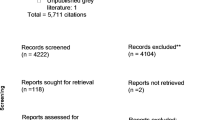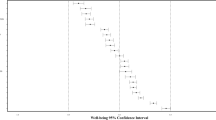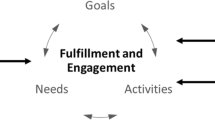Abstract
It is well established that family and work-retirement transitions are increasingly becoming more complicated, extended, and reversible among aging parents. Combined with improved life expectancy, older parents are now confronted with new opportunities and challenges including their access to leisure activities. However, a paucity of research exists with regard to the extent to which older-aged parents are satisfied with their amount of leisure time as well as their ideal leisure preferences. Drawing upon socio-cultural life course theory, this paper examines how socio-demographic and ethnocultural variables (i.e., gender, ethnic identity), family-related factors (e.g., presence of children in the household), and socio-economic and work contexts (i.e., income satisfaction and retirement status) shape leisure time satisfaction and activity preferences. Data are drawn from the “Families and Retirement Project,” a sample of 588 diverse (British-, Chinese-, Iranian/Persian-, South-Asian Canadians) aged 50 + (mean age = 59.6) residing in Metro Vancouver with at least one young adult child aged 19–35. Quantitative analyses reveal that leisure time satisfaction is higher among: those reporting lower levels of parental stress, the fully retired, those with less education, and among Chinese parents (compared to British). Moreover, strong variations by ethnic background are shown in preferred leisure activity, based on a thematic analysis of data. Results are discussed in terms of contributions to a socio-cultural family life course activity theory. Implications for community service provision (e.g., culturally sensitive and relevant recreational programs and services) are also highlighted, given the salience of participation in enjoyable leisure activities to healthy aging.
Similar content being viewed by others
References
Adams, K. B., Leibbrandt, S., & Moon, H. (2011). A critical review of the literature on social and leisure activity and well-being in later life. Ageing & Society, 31, 683–712
Atival, D. (2017). Gender differences in leisure patterns at age 50 and above: Micro and macro aspects. Aging & Society, 37, 139–166
Bhatt, G., Tonks, R. G., & Berry, J. W. (2013). Culture in the history of psychology in Canada. Canadian Psychology, 54, 115–123
Baltes, P. B., & Baltes, M. M. (1990). Successful aging: Perspectives from the behavioural sciences. Cambridge University Press
Beaver, K. M., & Belsky, J. (2012). Gene-environment interaction and the intergenerational transmission of parenting: Testing the differential-susceptibility hypothesis. Psychiatric Quarterly, 83, 29–40
Behjati-Sabet, A., & Chambers, N. (2005). People of Iranian descent. In N. Waxler-Morrison, J. M. Anderson, E. Richarson, & N. Chambers (Eds.), Cross-cultural caring: A handbook for health professionals (2nd ed., pp. 127–161). University of British Columbia Press
Berry, J. O., & Jones, W. H. (1995). The parental stress scale: Initial psychometric evidence. Journal of Social and Personal Relationships, 12(3), 463–472
Brown, T. H. (2018). Racial stratification, immigration, and health inequality: A life course-intersectional approach. Social Forces, 96, 1507–1540
Brown, B. A., & Frankel, B. G. (1993). Activity through the years: Leisure, leisure satisfaction and life satisfaction. Sociology of Sport Journal, 10, 1–17
Broughton, K., & Beggs, B. A. (2007). Leisure satisfaction of older adults. Activities, Adaptation & Aging, 31, 1–18
Canadian Index of Wellbeing. (2016). How are Canadians really doing? The 2016 CIW national report. Canadian Index of Wellbeing and University of Waterloo
Carstensen, L. L. (2006). The influence of a sense of time on human development. Science, 312, 1913–1915
Chang, E., Choi, S., Kwon, I., Araiza, D., Moore, M., Trejo, L. & Sarkisian, C. (2018). Characterizing beliefs about stroke and walking in exercise among seniors from four racial/ethnic minority communities. Journal of Cross Cultural Gerontology. Published online, first retrieved August 26, 2018. https://doi.org/10.1007/s10823-018-9356-6
Conn, V., Chan, K., Banks, J., Ruppar, T., & Scharff, J. (2013). Cultural relevance of physical activity interventions research with underrepresented populations. International Quarterly of Community Health Education, 34, 391–414
Cumming, E., & Henry, W. E. (1961). Growing old: The process of disengagement. Basic Books
Deng, J., Walker, G. J., & Swinnerton, G. (2005). Leisure attitudes: A comparison between Chinese in Canada and Anglo Canadians. Leisure/loisir, 29, 239–273
Elder, G. H. (1994). Families in troubled times: Adapting to change in rural American. Aldine de Gruyter
Elder, G. H. (1995). Life trajectories in changing societies. In A. Bandura (Ed.), Self-efficacy in changing societies (pp. 46–57). Cambridge University Press
Fingerman, K. L., Cheng, Y.-P., Birditt, K., & Zarit, S. (2012). Only as happy as the least happy child: Multiple grown children’s problems and successes and middle-aged parents’ well- being. Journals of Gerontology, b: Psychological and Social Sciences B, 67(2), 184–193
Fingerman, K. L., Kim, K., Birditt, K., & Zarit, S. H. (2016). The ties that bind: Midlife parents’ daily experiences with grown children. Journal of Marriage and the Family, 78, 431–450
Friedland, D. S., & Price, R. H. (2003). Underemployment: consequences for the health and well-being of workers. American Journal of Community Psychology, 32, 33–45
Gagliardi, C., Spazzafumo, L., Papa, R., & Marcellini, F. (2012). Changes in leisure styles and satisfaction of older people: A five year follow-up. International Journal of Aging and Human Development, 75, 185–215
Gsellmeier, K., Cochran, L. J., & Dauenhauer, J. (2015). The impact of marital status and gender on leisure values of older adults. Activities, Adaptation & Aging, 39, 183–199
Kim, E., Kleiber, D., & Kropf, N. (2002). Leisure activity, ethnic preservation, and cultural integration of older Korean Americans. Journal of Gerontological Social Work, 36, 1–2
Kim, J., Park, S.-H., Malonebeach, E., & Heo, J. (2016). Migrating to the east: Investigation of acculturation and leisure activities. Leisure Studies, 35, 421–437
Michèle, J., Guillaume, M., Alain, T., Nathalie, B., Claude, F., & Kamel, G. (2019). Social and leisure activity profiles and well-being among the older adults: A longitudinal study. Aging & Mental Health, 23, 77–83
Milkie, M., Bierman, A., & Schieman, S. (2008). How adult children influence older parents’ mental health: Integrating stress-process and life-course perspectives. Social Psychological Quarterly, 71, 86–105
Mitchell, B. A. (2010). Midlife marital happiness and ethnic culture: A life course perspective. Journal of Comparative Family Studies, 41, 166–183
Mitchell, B. A. (2014). Generational juggling acts in midlife families: Gendered and ethno-cultural intersections. Journal of Women and Aging, 26, 332–350
Mitchell, B. A., & Lovegreen, L. (2009). The empty nest syndrome in midlife families: A multi-method exploration of parental gender differences and cultural dynamics”. Journal of Family Issues, 30, 1654–1670
Mitchell, B. A., Wister, A. V., & Zdaniek, B. (2019). Are the parents all right? Parental stress, ethnic culture, and intergenerational relations in aging families. Journal of Comparative Family Studies, 50(1), 51–74
Nicolaisen, M., Thorsen, K. & Eriksen S. H. (2012). Jump into the void? Factors related to a preferred retirement age: gender, social interests, and leisure activities. International Journal of Aging and Human Development, 75, 239–271
Nimrod, G. (2007). Retirees’ leisure: Activities, benefits, and their contribution to life satisfaction. Leisure Studies, 26, 65–80
Nimrod, G., & Shrira, A. (2016). The paradox of leisure in later life. The Journals of Gerontology: Series B, 71, 106–111
Noels, K., & Berry, J. (2016). Acculturation in Canada. In D. Sam & J. Berry (Eds.), The Cambridge handbook of acculturation psychology (pp. 199–226). Cambridge University Press
Parisi, J., Roberts, L., Szanton, S., Hodgson, N., & Gitlin, L. N. (2017). Valued activities among individuals with and without cognitive impairments: Findings from the national health and aging trends study. The Gerontologist, 57, 309–318
Pudrovska, T. (2009). Parenthood, stress, and mental health in late midlife and early old age. International Journal of Aging and Human Development, 68, 127–147
Rosenkranz, R. R., Duncan, M. J., Rosenkranz, S. K., & Kolt, G. S. (2013). Active lifestyles related to excellent self-rated health and quality of life: Cross sectional findings from 194,545 participants in the 45 and up study. BMC Public Health, 13, 1071. https://doi.org/10.1186/1471-2458-13-1071
Rubenstein, J. M. (1987). Leisure participation and satisfaction in two European communities. Journal of Cross-Cultural Gerontology, 2, 151–170
Sam, D. L., & Berry, J. W. (2010). Acculturation: When individuals and groups of different cultural backgrounds meet. Perspectives on Psychological Science, 5, 472–481
Schneider, B., & McCoy, L. (2017). Serious leisure, play and the construction of community among older adult square dancers. Activities, Adaptation & Aging, 42, 54–68
Stebbins, R. (2007). Serious leisure: A perspective for our time. Transaction Press
Stevens, A. B., Coon, D., Wisniewski, S., Vance, D., Arguelles, S., Belle, S., Mendelsohn, A., Ory, M., & Haley, W. (2004). Measurement of leisure time satisfaction in family caregivers. Aging & Mental Health, 8, 450–459
Statistics Canada. (2017). Focus on geography series, 2016 census. Catalogue no. 98-404-X2016001. Minister of Industry
Stodolska, M., & Alexandris, K. (2004). The role of recreational sport in the adaptation of first generation immigrants in the United States. Journal of Leisure Research, 36, 379–413
Stodolska, M., Shinew, M., Floyd, S. M., & Walker, G. J. (Eds.). (2014). Race, ethnicity, and leisure: Perspectives on research, theory, and practice. Human Kinetics
Sturgeon, J. A., Arewasikporn, A., Okun, M. A., Davis, M. C., Ong, A. D., & Zautra, A. J. (2016). The psychosocial context of financial stress: Implications for inflammation and psychological health. Psychosomatic Medicine, 78, 134–143
Toepoel, V. (2013). Ageing, leisure, and social connectedness: How could leisure help reduce social isolation of older people. Social Indicators Research, 113, 355–372
Verbrugge, L. M., & Liu, X. (2014). Midlife trends in activities and disability. Journal of Aging and Health, 26, 178–206
Walker, G. J., & Ito, E. (2017). Mainland Chinese Canadian immigrants’ leisure satisfaction and subjective well-being: Results of a two-year longitudinal study. Leisure Sciences, 39, 174–185
Walker, G. J., Halpenny, E., Spiers, A., & Deng, J. (2011). A prospective panel study of Chinese-Canadian immigrants’ leisure participation and leisure satisfaction. Leisure Sciences, 33, 349–365
Wong, J. D., & Shobo, Y. (2017). The moderating influences of retirement transition, age, and gender on daily stressors and psychological distress. International Journal of Aging and Human Development, 85, 90–107
Yue, K.-M.K. (2005). People of Chinese descent. In J. M. Waxler-Morrison, E. Richardson. Anderson, & N. Chambers (Eds.), Cross-Cultural caring: A handbook for health professionals (2nd ed., pp. 59–94). University of British Columbia Press
Acknowledgements
This study was funded by the Social Sciences and Humanities Research Council of Canada (no. 435-2014-0197).
Author information
Authors and Affiliations
Corresponding author
Ethics declarations
Conflict of Interest
The authors declare that they have no conflict of interest.
Additional information
Publisher's Note
Springer Nature remains neutral with regard to jurisdictional claims in published maps and institutional affiliations.
Rights and permissions
About this article
Cite this article
Mitchell, B.A., Wister, A.V. & Fyffe, I.A. Leisure Time Satisfaction and Activity Preferences Among Ethnically Diverse Aging Parents in Metro Vancouver. J Cross Cult Gerontol 36, 387–406 (2021). https://doi.org/10.1007/s10823-021-09440-0
Accepted:
Published:
Issue Date:
DOI: https://doi.org/10.1007/s10823-021-09440-0




